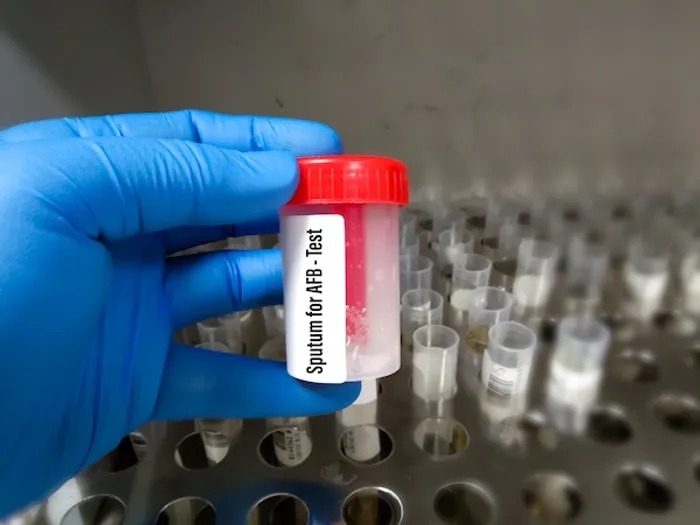Sputum AFB Test: Procedure and Preparation
Learn about the Sputum AFB test, a key diagnostic tool for tuberculosis. Understand the procedure, how to prepare, and what the results mean for effective TB detection and treatment.


If you or someone you know has been experiencing a persistent cough, especially with mucus (sputum), your doctor may recommend a Sputum AFB (Acid-Fast Bacilli) Test. This test helps detect tuberculosis (TB) and other infections caused by acid-fast bacteria.
In this article, we’ll explain what the test is, why it’s done, how to prepare, and what to expect during and after the procedure.
What is a Sputum AFB Test?
The Sputum AFB Test is a diagnostic test that checks for tuberculosis (TB) or other bacterial infections in the lungs. It examines your sputum (mucus coughed up from the lungs) under a microscope or through a culture to identify acid-fast bacteria, particularly Mycobacterium tuberculosis, which causes TB.
Why is it Done?
This test is recommended if you have:
- A persistent cough lasting more than 2-3 weeks
- Coughing up blood or thick mucus
- Unexplained weight loss, fever, or night sweats (common TB symptoms)
- Been in close contact with someone diagnosed with TB
Early detection helps in timely treatment, preventing complications and the spread of infection.
How to Prepare for the Test?
Preparing for a Sputum AFB Test is simple, but following these steps ensures accurate results:
Before the Test
1. Morning Sample is Best: Bacteria are more concentrated in the morning, so your first cough after waking up is ideal.
2. Rinse Your Mouth: Brush your teeth and rinse with water (avoid mouthwash, as it may kill bacteria needed for testing).
3. Avoid Eating or Drinking: Do not eat, drink, or smoke for at least 1-2 hours before giving the sample.
During Sample Collection
- Take deep breaths and cough deeply to bring up sputum from your lungs (not saliva from your mouth).
- Spit the mucus into a sterile container provided by the lab.
- If coughing is difficult, your doctor may suggest aerosol inhalation to help produce sputum.
After the Test
- Close the container tightly and hand it to the lab technician.
- Wash your hands thoroughly to prevent spreading infection.
Consult Top Specialists
What Happens During the Test?
The test itself is non-invasive—you only need to provide a sputum sample. However, the lab process involves:
1. Microscopic Examination: The sample is stained and checked under a microscope for acid-fast bacteria.
2. Culture Test: If needed, the sample is cultured (grown in a lab) to confirm TB or other infections, which may take 2-8 weeks.
3. Molecular Tests (like PCR): Faster methods may be used for quicker results.
How Long Does It Take to Get Results?
- Initial microscopy results: 1-2 days.
- Culture results: Several weeks.
- Molecular tests (like GeneXpert): 1-2 days.
Your doctor will explain the findings and next steps.
What Do the Results Mean?
- Negative Result: No TB bacteria detected. However, if symptoms persist, your doctor may recommend further tests.
- Positive Result: Indicates TB or another bacterial infection. Additional tests (like chest X-rays) may be needed to confirm.
If diagnosed with TB, early treatment with antibiotics is crucial to recovery and preventing spread.
Tips for Managing TB or Respiratory Infections
If you have TB or another lung infection, follow these steps for better health:
1. Take Medications as Prescribed
TB treatment usually lasts 6-9 months. Do not skip doses, as incomplete treatment can lead to drug-resistant TB.
2. Maintain Good Hygiene
- Cover your mouth when coughing.
- Dispose of tissues properly.
- Wash hands frequently.
3. Improve Your Diet
- Eat protein-rich foods (eggs, lentils, dairy) to boost immunity.
- Stay hydrated to loosen mucus.
- Avoid smoking and alcohol.
4. Rest and Light Exercise
- Get enough sleep for recovery.
- Gentle breathing exercises can help lung function.
When to See a Doctor?
Consult a doctor if you have:
- Persistent cough (more than 2 weeks)
- Fever, night sweats, or weight loss
- Blood in sputum
- Been exposed to TB
Early testing can prevent complications.
Book a Sputum AFB Test with Apollo 24|7
If your doctor has recommended a Sputum AFB Test, you can easily schedule a test or consultation through Apollo 24|7.
Why Choose Apollo 24|7?
- Accurate and reliable testing
- Home sample collection available
- Expert doctors for consultation
Conclusion
The Sputum AFB Test is a simple yet crucial test for detecting TB and other lung infections. If you have symptoms, don’t ignore them—early diagnosis leads to better treatment outcomes. Follow your doctor’s advice, maintain good hygiene, and take prescribed medications properly.
Would you like to consult a doctor?
Consult Top Specialists
Consult Top Specialists

Dr. Syed Ismail Ali
General Practitioner
7 Years • MBBS
Hyderabad
Apollo 24|7 Clinic, Hyderabad

Dr. Md Yusuf Shareef
General Practitioner
8 Years • MBBS
Hyderabad
Apollo 24|7 Clinic, Hyderabad

Dr. Shubham Chauhan
General Practitioner
4 Years • MBBS
Lucknow
Apollo 24|7 Clinic - Uttar Pradesh, Lucknow

Dr Summaiya Banu
General Practitioner
8 Years • MBBS
Hyderabad
Apollo 24|7 Clinic, Hyderabad
(225+ Patients)

Dr. D Bhanu Prakash
General Practitioner
10 Years • MBBS, AFIH, Advanced certificate in critical care medicine, Fellowship in critical care medicine
Hyderabad
Apollo 24|7 Clinic, Hyderabad
Consult Top Specialists

Dr. Syed Ismail Ali
General Practitioner
7 Years • MBBS
Hyderabad
Apollo 24|7 Clinic, Hyderabad

Dr. Md Yusuf Shareef
General Practitioner
8 Years • MBBS
Hyderabad
Apollo 24|7 Clinic, Hyderabad

Dr. Shubham Chauhan
General Practitioner
4 Years • MBBS
Lucknow
Apollo 24|7 Clinic - Uttar Pradesh, Lucknow

Dr Summaiya Banu
General Practitioner
8 Years • MBBS
Hyderabad
Apollo 24|7 Clinic, Hyderabad
(225+ Patients)

Dr. D Bhanu Prakash
General Practitioner
10 Years • MBBS, AFIH, Advanced certificate in critical care medicine, Fellowship in critical care medicine
Hyderabad
Apollo 24|7 Clinic, Hyderabad